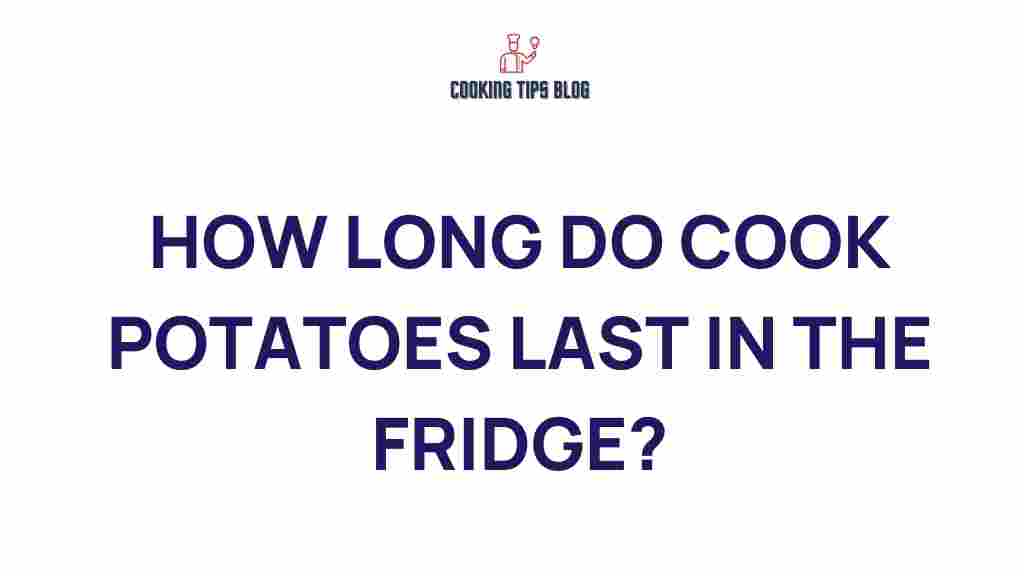The Surprising Shelf Life of Cooked Potatoes
When it comes to meal prep and leftovers, understanding the shelf life of different foods is essential for both safety and taste. One common food that many people cook in bulk is potatoes. But what happens to cooked potatoes when they find their way into your fridge? In this article, we will explore the surprising shelf life of cooked potatoes, how to store them properly, and some tips for troubleshooting common issues.
The Basics of Cooked Potatoes
Cooked potatoes are versatile and can be used in a variety of dishes, from mashed potatoes to potato salads. However, their shelf life can vary based on several factors, including the method of cooking, storage conditions, and whether they have been seasoned or mixed with other ingredients.
How Long Do Cooked Potatoes Last in the Fridge?
Generally, cooked potatoes can last in your fridge for about 3 to 5 days if stored properly. Here are some key points to remember:
- Storage Temperature: Ensure your fridge is set to 40°F (4°C) or lower.
- Container: Use airtight containers to minimize exposure to air.
- Moisture Control: Avoid excess moisture, which can lead to spoilage.
Factors Affecting Shelf Life
The shelf life of cooked potatoes can be influenced by several factors:
- Cooking Method: Baked potatoes may last longer than boiled potatoes due to less moisture.
- Ingredients: Potatoes mixed with dairy or other perishable ingredients may spoil faster.
- Initial Freshness: Starting with fresh potatoes will always yield better results.
Proper Storage Techniques
To maximize the shelf life of cooked potatoes, follow these storage tips:
- Cool Down: Allow cooked potatoes to cool to room temperature before storing them in the fridge.
- Use Airtight Containers: Place the potatoes in airtight containers to prevent moisture and odors from affecting them.
- Label and Date: Always label your containers with the date of storage to keep track of freshness.
- Refrigerate Promptly: Store cooked potatoes in the fridge within two hours of cooking.
How to Reheat Cooked Potatoes Safely
When it’s time to enjoy your cooked potatoes again, reheating them properly is crucial. Here’s how:
- Microwave: Heat on medium power in 30-second intervals until warmed through.
- Oven: Preheat the oven to 350°F (175°C) and reheat for about 15 minutes.
- Stovetop: Sauté in a pan with a little oil or butter for added flavor.
Signs of Spoilage
Even with proper storage, it’s essential to check for signs of spoilage before consuming cooked potatoes. Here are some things to look out for:
- Odor: A sour or off smell indicates that the potatoes have gone bad.
- Texture: Slimy or mushy potatoes should be discarded.
- Color: Dark spots or discoloration can be a sign of spoilage.
Troubleshooting Common Issues
Here are some common issues you might encounter with cooked potatoes and how to troubleshoot them:
Issue: Potatoes Have a Sour Smell
Solution: This usually indicates spoilage. It’s best to throw them out to avoid foodborne illness.
Issue: Potatoes Are Slimy
Solution: Discard any slimy potatoes immediately, as this is a clear sign of spoilage.
Issue: Potatoes Are Dry or Hard
Solution: Reheat them with a little moisture (like broth or water) to restore some softness.
Creative Ways to Use Cooked Potatoes
If you find yourself with leftover cooked potatoes, consider these creative uses:
- Potato Salad: Chop and mix with your favorite dressing and veggies.
- Hash Browns: Shred and pan-fry for a delicious breakfast option.
- Mashed Potatoes: Reheat and mash with butter, cream, or cheese for a comforting side dish.
Conclusion
Understanding the shelf life of cooked potatoes is crucial for food safety and minimizing waste. By following proper storage techniques and being aware of the signs of spoilage, you can enjoy your cooked potatoes without worry. Remember, while cooked potatoes can last in the fridge for 3 to 5 days, always check for freshness before consuming. For more tips on food storage and safety, visit FoodSafety.gov.
Now that you know how to handle your cooked potatoes, make the most of your leftovers and enjoy delicious meals all week long!
For additional information, check out our guide on food preservation techniques!
This article is in the category Basic and created by Cookingtipsblog Team
